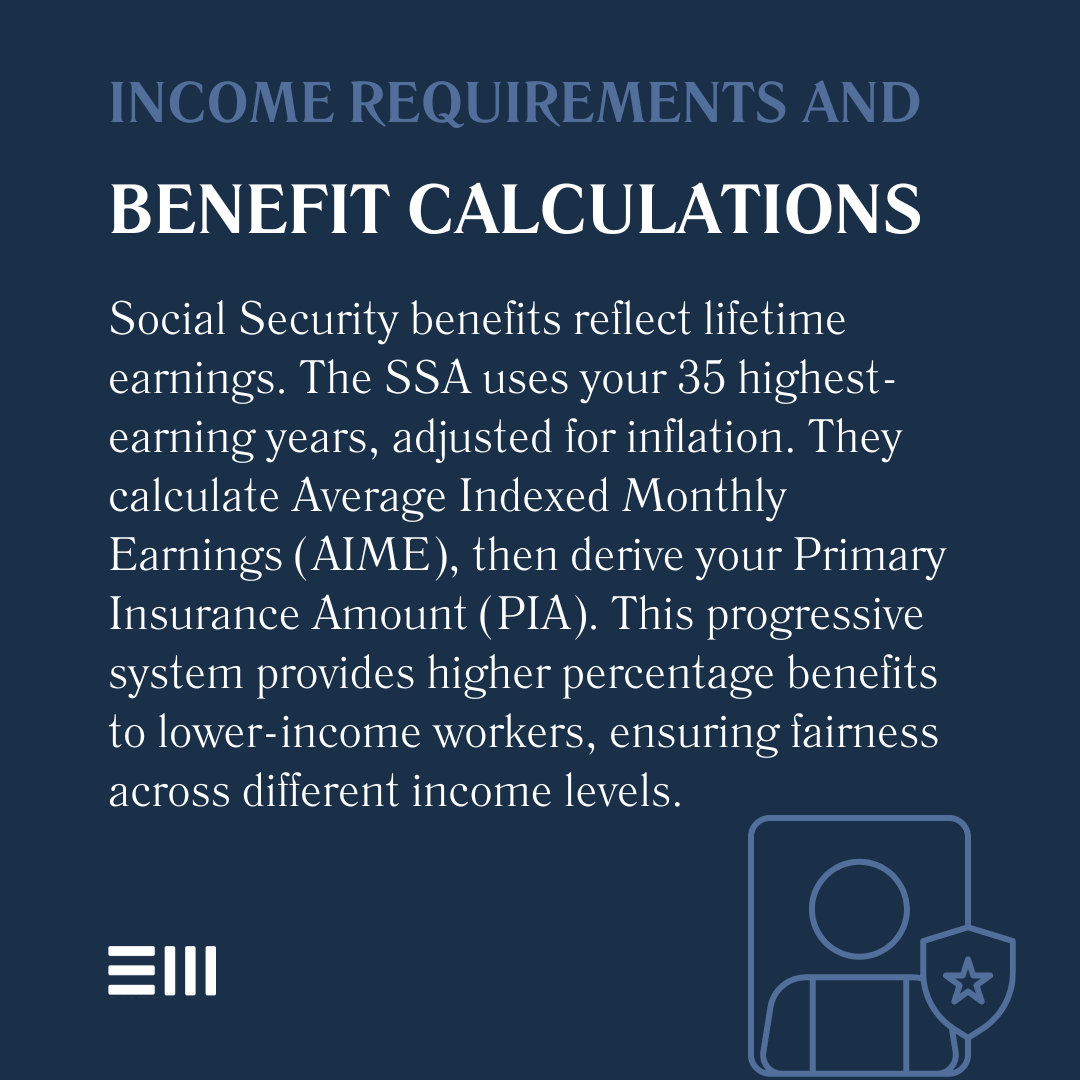Baxley Maniscalco Attorneys At Law
Did you know that nearly 9 out of 10 Americans aged 65 and older receive Social Security benefits?
This crucial program provides a financial safety net for millions, but understanding how to qualify can be complex.
Let's dive into the work and income requirements that determine your eligibility for Social Security benefits.
Understanding Social Security Qualification
Social Security is a federal program designed to provide financial support to retirees, disabled individuals, and their families. To qualify for these benefits, you must meet specific work and income requirements set by the Social Security Administration (SSA).
These requirements ensure that individuals have contributed to the system through payroll taxes before receiving benefits.
The qualification process involves earning "credits" based on your work history and income. Let's explore how these credits work and what you need to know to secure your financial future.
How Social Security Credits Work
At the heart of Social Security qualification are credits. These are the building blocks that determine your eligibility for benefits.
Here's what you need to know about Social Security credits:
- Earning credits: You can earn up to four credits per year based on your annual income.
- Credit value: In 2024, you earn one credit for every $1,730 in covered earnings.
- Maximum credits: You can earn a maximum of four credits per year, regardless of how much you earn.
- Lifetime accumulation: Credits accumulate over your entire working life, not just in recent years.
Understanding how credits work is crucial for planning your retirement and ensuring you meet the qualification requirements for Social Security benefits.
Work Requirements for Social Security Retirement Benefits
To qualify for retirement benefits, you need to accumulate a certain number of credits throughout your working life.
Here's what you should know:
- Minimum credit requirement: You generally need 40 credits (equivalent to 10 years of work) to qualify for retirement benefits.
- Born after 1929: If you were born after 1929, you need the full 40 credits to qualify.
- Older workers: Those born before 1929 may qualify with fewer credits.
- Continuous work not required: You don't need to work continuously for 10 years; credits can be earned over your entire working life.
Meeting these work requirements is essential for securing your retirement benefits. However, it's important to note that the number of credits you earn affects your benefit amount.
Income Requirements and Benefit Calculations
While credits determine your eligibility, your income history plays a significant role in calculating your benefit amount.
Here's how income factors into your Social Security benefits:
- Highest-earning years: The SSA considers your 35 highest-earning years when calculating your benefits.
- Indexed earnings: Your past earnings are adjusted for inflation to reflect current wage levels.
- Average Indexed Monthly Earnings (AIME): This is calculated by dividing your total indexed earnings by the number of months in your benefit computation years.
- Primary Insurance Amount (PIA): Your PIA is derived from your AIME using a progressive formula that provides a higher percentage benefit to lower-income workers.
Understanding how your income history affects your benefits can help you make informed decisions about your work and retirement planning.
Special Rules for Disability Benefits
Qualifying for Social Security Disability Insurance (SSDI) has different requirements compared to retirement benefits.
Here's what you need to know:
- Recent work test: You must have worked recently enough before becoming disabled.
- Duration of work test: You must have worked long enough under Social Security.
- Credit requirements vary: The number of credits needed depends on your age when you become disabled.
- Medical condition: You must have a medical condition that meets the SSA's definition of disability.
These special rules ensure that individuals who become disabled before reaching retirement age can still receive support through the Social Security system.
Frequently Asked Questions About Qualifying for Social Security Benefits
Let's address some of the most common inquiries to help you navigate the path to securing your Social Security future.
How Many Credits Do I Need to Qualify for Social Security?
For most people, 40 credits (equivalent to 10 years of work) are required to qualify for Social Security retirement benefits.
However, the exact number may vary depending on your birth year and the type of benefits you're seeking.
Can I Check My Social Security Credits Online?
Yes, you can check your Social Security credits and earnings history by creating a my Social Security account on the SSA's website.
This tool allows you to review your work history and plan for your future benefits.
How Does Self-Employment Affect Social Security Qualification?
Self-employed individuals can earn Social Security credits just like traditional employees. However, they are responsible for paying both the employee and employer portions of Social Security taxes.
It's crucial for self-employed individuals to report their income accurately to ensure they receive proper credit for their work.
Can I Receive Social Security Benefits While Working?
Yes, you can receive Social Security retirement benefits while working. However, if you're younger than full retirement age and earn above certain thresholds, your benefits may be temporarily reduced.
Once you reach full retirement age, there's no penalty for working while receiving benefits.
How Does Military Service Affect Social Security Qualification?
Military service members pay Social Security taxes and earn credits just like civilian workers. Additionally, they may receive special credits for certain periods of active duty.
These credits can help service members qualify for Social Security benefits more quickly.
What Happens If I Work in Another Country?
If you work in another country, your earnings may still count towards Social Security if:
- You work for an American company.
- You work in a country with a social security agreement with the United States.
- You pay self-employment taxes to the U.S. while working abroad.
It's important to understand international agreements and how they affect your Social Security qualification if you work outside the United States.
How Are Social Security Benefits Taxed?
The taxation of Social Security benefits depends on your total income:
- No taxes: If your combined income is below $25,000 (single) or $32,000 (married filing jointly), your benefits are not taxed.
- Up to 50% taxable: If your income is between $25,000-$34,000 (single) or $32,000-$44,000 (married filing jointly), up to 50% of your benefits may be taxable.
- Up to 85% taxable: If your income is above $34,000 (single) or $44,000 (married filing jointly), up to 85% of your benefits may be taxable.
Understanding the tax implications of your Social Security benefits can help you plan your retirement finances more effectively.
Can Non-Citizens Qualify for Social Security Benefits?
Non-citizens can qualify for Social Security benefits if they meet certain criteria:
- Legal work status: They must have permission to work in the U.S. and have a valid Social Security number.
- Earn credits: They need to earn the required number of work credits, just like U.S. citizens.
- Meet other eligibility requirements: They must meet all other eligibility criteria for the specific benefit they're seeking.
It's important for non-citizens to understand their rights and responsibilities regarding Social Security qualifications.
How Does a Government Pension Affect Social Security Benefits?
If you receive a pension from a government job where you didn't pay Social Security taxes, your Social Security benefits may be reduced.
This is known as the Windfall Elimination Provision (WEP) and the Government Pension Offset (GPO). It's crucial to understand these provisions if you've worked in both covered and non-covered employment.
Secure Your Future With Expert Guidance
Navigating the complexities of Social Security qualification can be challenging, but you don't have to do it alone.
At Baxley Maniscalco, we're committed to helping Alabama residents understand their rights and options when it comes to Social Security benefits.
Whether you're planning for retirement, facing disability, or simply want to ensure you're on the right track, our experienced team is here to help.
Don't leave your financial future to chance. Take the first step towards securing your benefits today.
Contact Baxley Maniscalco now for a personalized consultation. Let us help you navigate the Social Security system and maximize your benefits.
Your financial security is our priority.


